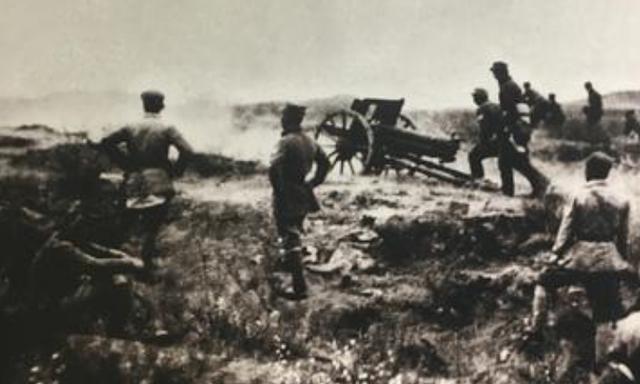On August 15, 1945, with the victory of the War of Resistance Against Japanese Aggression, in the face of the unanimous desire of the people at home for peace, the Kuomintang and the Communists launched peace negotiations, and signed the "Double Tenth Agreement" on October 10, 1945, according to this trend, the overall situation of domestic peace was about to take shape, and the democratic parties would also jointly negotiate the establishment of the country, but the Kuomintang army headed by Chiang Kai-shek was actively mobilizing troops, and finally in June 1946, the peace agreement was torn up, and a full-scale civil war broke out.

Even in January 1946, the two sides signed the "Agreement on The Cessation of Internal Military Conflicts", and on January 30, they participated in the Political Consultative Conference with the participation of democrats of all parties and adopted the "Resolution of the Political Consultative Conference".
After the end of the War of Resistance Against Japanese Aggression, the total strength of the various units of the Kuomintang army was about 5.9 million, and after the completion of the reduction, it was 4.3 million, of which the regular army units had 86 integrated divisions and 2 million people, and the special forces, rear organs, schools, and the formation of the navy and air force were not counted (the reorganization plan was not completed, and the civil war broke out).
Out of the desire for peace and the signing of the "Double Tenth Agreement," on February 1, 1946, the Central Committee issued the "Instructions of the Central Committee on the Current Situation and Tasks" to the major military regions, in addition to mentioning that China should be built into a peaceful and democratic country in the future, it also announced that the whole army required all armies to implement the lean army and simplify the administration.
What is even more crucial is that at that time, Chiang Kai-shek used US warships to massively transfer troops to the northeast, and there was also a risk of a civil war, so our army immediately launched a tit-for-tat strategy, that is, the principle of "developing to the north and defending to the south," and dispatched backbone cadres from major military regions to support the northeast battlefield.
Out of distrust of the Kuomintang army, our army basically did not put in place the actual implementation of crack troops and simplified administration in the future, except for the Jin-Cha-Ji Military Region. In fact, by the outbreak of the all-out civil war in June 1946, the Jin-Cha-Ji Military Region had already laid off more than 100,000 people, accounting for one-third of the entire military region, and the total strength of the entire military region was only 200,000 people, while the Jin-Cha-Ji Field Army originally had 9 columns under its jurisdiction, and after the lean army and simplified administration, only 4 columns were retained, and each column was reduced from the original 9 regiments to 6 regiments, and the original size of 200,000 people was reduced to only more than 50,000 people.
The reason why the implementation was relatively thorough, in addition to the orders issued by the superiors, was also related to the environmental factors at that time, especially the Kuomintang army headed by Chiang Kai-shek, which had been keeping a close eye on the north China region, after all, during the War of Resistance Against Japanese Aggression, this area belonged to the occupied areas, and the Kuomintang army basically did not have an advantage in the local area.
After the outbreak of the all-out civil war in June 1946, the Jin-Cha-Ji Military Region naturally had little strength to deal with the attack of the surrounding Kuomintang troops, just during the Battle of Datong Jining, the Kuomintang army invaded Chengde, and although the local troops of the Jin-Cha-Ji Military Region resisted step by step, chengde was eventually lost, coupled with the later Battle of Zhangjiakou, the direction of the Kuomintang army's attack was misestimated, which eventually led to the premature loss of Zhangjiakou, and the entire Jin-Cha-Ji Military Region had been de facto split in half.
As a last resort, the Jin-Cha-Ji Military Region could only assign the Jireliao area to the Northeast Democratic United Army, and the Jin-Cha-Ji Military Region's territory was greatly reduced, its troops were stretched to the limit, and it was so difficult to make a difference, and even when the other major military regions were successively achieving the achievement of annihilating the enemy in a complete formation, the Jin-Cha-Ji Military Region could not even fight a small-scale ambush, and it was not until the end of December 1946 that the Jin-Cha-Ji Field Army gradually recovered its vitality, and under full mobilization, The Jin-Cha-Ji Field Army expanded to 75,000 men.
However, because the early operations were basically in an unfavorable situation, until the middle of 1947, the Jin-Cha-Ji Field Army still failed to smoothly open up the situation of operations in North China, so after considering this situation, the superiors began to consider North China and Northeast China as a whole, and since the second year of the Liberation War, the task of the Jin-Cha-Ji Field Army has become to cooperate with the northeast operation, trying to contain the Kuomintang troops in North China from aiding the north, until 1947, when the Northeast Democratic Coalition Army launched the Autumn Offensive, and Chiang Kai-shek transferred 3 divisions to aid the northeast. Only then did the Jin-Cha-Ji Field Army in North China usher in the opportunity to open up the situation, completely liberate Shijiazhuang, and make the Jin-Cha-Ji and Jin-Ji Luyu one.